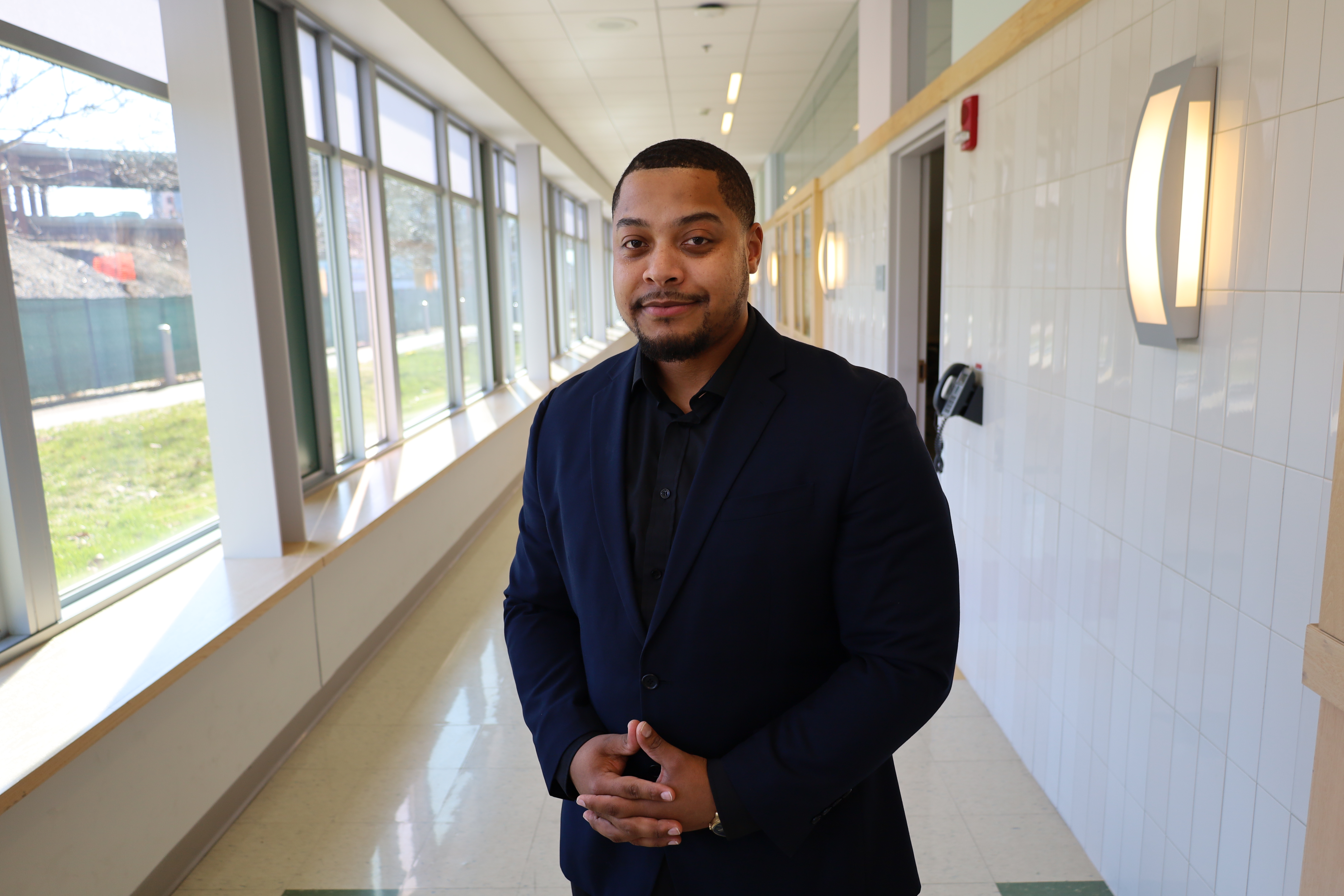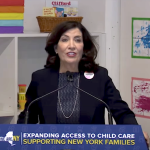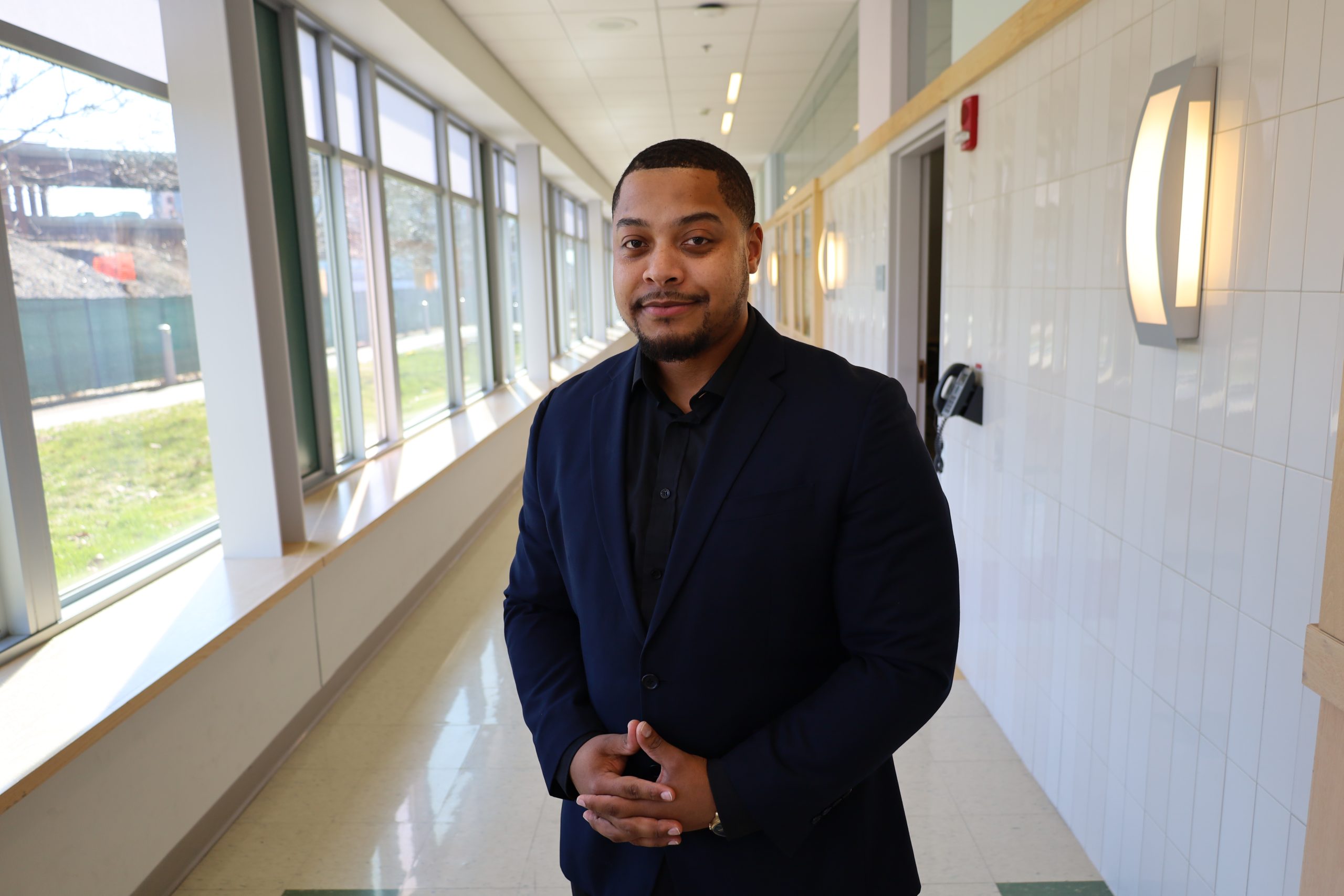
Misael Carrasquillo
Leadership is about people who want to change the world – and it’s about the institutions that train these leaders. That’s why it’s an honor to recognize Bunker Hill Community College (BHCC) and Misael Carrasquillo, one of its graduates and employees.
Fifty years ago, Bunker Hill opened its doors to students. Since then it has become one of the most affordable, most diverse colleges in the state with two main campuses in Charlestown and Chelsea.
Strategies for Children has hosted four interns from Bunker Hill in recent years, and while none of them have had early education experience, they have brought the invaluable gift of their life experiences, knowledge from their fields of study (business, political science, and communications), as well as their passion for social change.
Earlier this spring, Amy O’Leary, the executive director of Strategies for Children, attended a Bunker Hill’s Strategic Planning Community Convening event where she met Misael Carrasquillo, who has devoted himself to learning everything he can so he can share his knowledge — and his institutional affiliations — with other people.
“I went to the Jeremiah E. Burke High School in Dorchester,†Carrasquillo explains, “and I didn’t know what I wanted to do after high school. Like a lot of students, I was living in the present, enjoying what life had to offer in that moment.â€
Carrasquillo had participated in the U.S. Marines Junior Reserve Officers’ Training Corps (JROTC). During his senior year, he was approached by a recruiter for the U.S. Marine Corps. So while his peers were worried about applying to college, Carrasquillo, who had his father’s support to enlist, was convincing his mother to sign the necessary paperwork.
“There was a $10,000 bonus that got me to say, yes. I had never seen that much money before, and my parents had never seen that much before.â€
“I was scared of being drafted into the military,†Carrasquillo adds, “and I think that subconsciously, enlisting was a way to face that fear.â€
He did four years of active duty, which included being stationed in North Carolina. When he was 20 years old, Carrasquillo did a tour in Afghanistan where he faced his fear of night duty.
Carrasquillo could have remained in the military, but he wanted to go to college. And when his family told him that his sister was attending Bunker Hill — a college he’d never heard of when he was in high school — he decided to join her.
“I majored in business administration because I felt I had led Marines well, so I thought that I could lead other people well. I did well at Bunker Hill because of what we now call affinity spaces: I pretty much lived at Bunker Hill’s Veterans Center.â€
Carrasquillo worked at the center as a work-study student and held a part-time job there. He treated school and work the way the military had trained him to: succeed and climb the ranks. He helped other students who were veterans understand how their military benefits worked. He won the business department’s Award for Academic Excellence and Bunker Hill’s Presidential Leadership award. And after he earned his associate’s degree, he worked for the Veterans Center as an administrative assistant.
Today, Carrasquillo is hard on himself, wishing he’d known more when he was younger, so he could have helped his fellow veterans more, could have said more about the importance of networking and internships.
“Our people,†he says of his Black and Latino peers and of people who come from poverty, as many veterans do, “Our people don’t always see the bigger picture. It’s hard when you’re dealing with day to day challenges in terms of making sure that you can pay the bills, take care of your parents, and take care of your kids. Our responsibilities can be more important than our education.â€
Job changes added new layers to Carrasquillo’s work as an advocate for other students. He moved from the Veterans Center to Bunker Hill’s Single Stop program, which helps students cover basic needs, including food, housing, child care, and legal services. He took what he learned on the job and shared it with his family and his community.
“I transferred back to the Veterans Center to gain more responsibility at Bunker Hill and to keep helping people. What I’ve done all my life, even as a teenager, is help, even helping my siblings. I’ve always been the trailblazer. Then I pass on the knowledge to them so that they can do things more efficiently.â€
Carrasquillo kept going: working full time and enrolling in Northeastern University’s College of Professional Studies full time.
“Northeastern is one of the most veteran-friendly schools,†he says, pointing to the generosity of the school’s Yellow Ribbon Program, which helps veterans pay for their education.
Carrasquillo earned a bachelor’s degree from Northeastern and a double master’s degree in business administration and in finance. He might have gone to work for a bank; instead he wanted to boost people’s financial literacy and help them understand how the economy works. He starts by sharing what he himself did not understand.
“I didn’t know that the Federal Reserve existed. I didn’t know the difference between monetary policy and fiscal policy and how to leverage that information. I didn’t understand how to leverage the financial market and how to create passive income.â€
Now he does. And he’s telling anyone who will listen about investing in real estate and intergenerational wealth so that he can change the narrative for his children and grandchildren – and for the children and grandchildren of other people.
“I want to empower my family. I want to empower my community, especially men of color because the data shows that they are the least likely to enroll in college, and the least likely to succeed in college, and the most likely to drop out.
“I always felt that the reason for this didn’t have anything to do with intelligence. It had to do with the fact that, like me, these men are first generation students and nontraditional students. Our parents didn’t go to college for the most part, so we didn’t have the guidance and preparation about what to look out for there. And we didn’t have the financial support, so we couldn’t focus solely on school.
“And in our community, we don’t expect to live till tomorrow. We feel like we have to make everything happen in our 20s, or else it’s too late.â€
Carrasquillo is 31, and he is thinking about the future. He wants to have his own business, and he wants to run a nonprofit organization that empowers Black and Latino communities in the United States and abroad. He has begun to do some of this work as the assistant director of Bunker Hill’s HOPE Initiative. HOPE stands for Halting Oppressive Pathways Through Education. The program is designed to “examine and eliminate the social, institutional, and academic barriers that often prevent males of color from achieving their full potential at BHCC and beyond.â€
“What we do,†Carrasquillo says, “is leverage our students’ cultural wealth. They know themselves better than we do. They bring perspectives from all around the world. So we keep our students at the center of everything we do. We always have them at the table.â€
It’s a powerful example of how much people and institutions can gain through mutual understanding and partnerships.
There are dozens of other lessons that Carrasquillo could share, but he chooses two.
“I’ve learned that you have to build relationships with students to get them to consider your advice, and so that we can get students to take advantage of the resources and opportunities that Bunker Hill has.â€
“Another thing I’ve learned is that in terms of the greater community, wealthy people may never understand the experiences that we’ve gone through, but what they can understand is our feelings. And when they understand our feelings — like anxiety about providing food for our families or depression about feeling like school is not for me — when they understand our feelings, then we can talk about the policy changes that need to happen. Feelings are universal.â€



